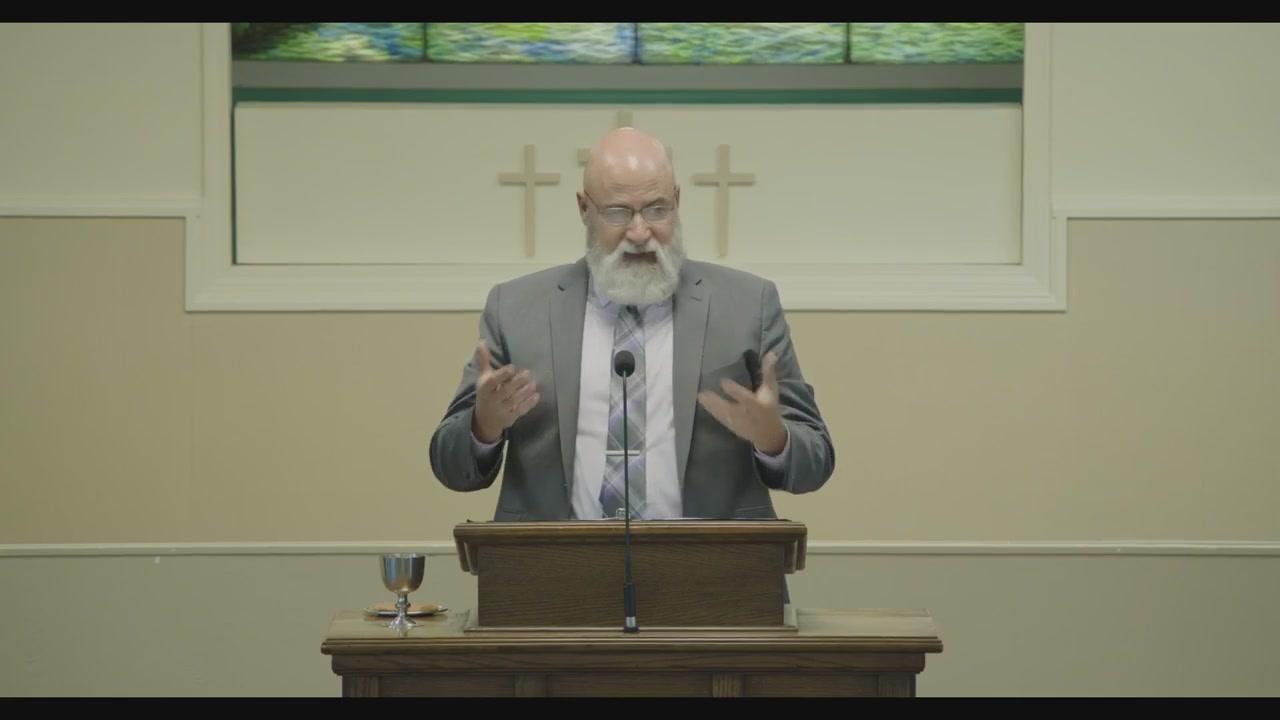
00:00
00:00
00:01
ប្រតិចារិក
1/0
We are about to partake of the Lord's Supper which we partake of monthly. The Bible describes the Lord's Supper as a visible proclamation of the Lord Jesus Christ and Him crucified. The bread represents the body of Christ. We've just heard about leaven and how leaven symbolizes sin and heresy. This bread is made without leaven to remind us of the act of obedience of Christ that He as a man perfectly obeyed God's holy law. But this bread is also broken to remind us of Christ's passive obedience, that he was bruised for our iniquities. As Isaiah 53 says, he was wounded for our transgressions, he was bruised for our iniquities, and the chastisement for our peace was upon him, and by his stripes we are healed. And from those wounds flowed his royal blood, and that is what's symbolized by the cup. The Lord's Supper is a church ordinance that is administered under the authority of the local church, and not everyone is permitted to partake. In order to partake of the supper with us this day, there are four requirements that we have deduced by good and necessary inference from the scriptures. First, you must be a regenerate, born again, and baptized disciple of the Lord Jesus Christ. Secondly, you must be an active member in good standing of a gospel preaching Protestant church. Now, if you're not currently a member of a local church, we're not saying you don't know the Lord, but we are saying you should not partake because you're not under anyone's authority or accountability. Or if you are a member on paper of a church, but you haven't been there in two or three years, you're not an active member of that church. And so you need to allow the elements to pass by you. Third, you must not be under the censure or the discipline of this church or any other local church. If you have been censured or excommunicated from a church then you need to repent before God and men. You need to go humble yourself and submit yourself and listen to the church that excommunicated you until they restore you. Fourth, if you are qualified to partake based on these first three requirements, then you must examine yourself and confess your sins before God and men so as to have a conscience devoid of offense in both places. This last requirement I want to focus on for just a moment. this requirement of examining yourselves. Of course, we find this in 1 Corinthians chapter 11 verses 27 to 32. Let me read it to you. Therefore, whoever eats this bread or drinks this cup of the Lord in an unworthy manner will be guilty of the body and blood of the Lord. But let a man examine himself And so let him eat of the bread and drink of the cup. But he who eats and drinks in an unworthy manner eats and drinks judgment to himself." Now listen to this next phrase, not discerning the Lord's body. In other words, he doesn't discern what these things symbolize and how they're holy and set apart. For this reason, many are weak and sick among you and many sleep. For if we would judge ourselves, we would not be judged. But when we are judged, we are chastened by the Lord, that we may not be condemned with the world." So what does Paul mean when he says examine yourself? He connects examining yourself to discerning the Lord's body. That is, if you approach the Lord's table in an irreverent or a cavalier manner, then you have not recognized the holiness of these symbols, that they symbolize something holy. You're profaning the Lord's Supper if you approach it in a cavalier or presumptuous manner. But examining yourself doesn't mean that you make yourself worthy by self-examination to partake of the table. As a matter of fact, what Paul seems to be saying is you're to examine yourself in the light of the cross. Because if you want to see how severe sin is, look no farther than the cross. If you're trying to evaluate your sin, you can look at Mount Sinai. You can think about the Ten Commandments and enumerate all the different ways in which you have violated that, and that's a good way to do it. It's a good way to hear the thunder of Sinai, as it were, and to feel that in your heart. But if you want to see something that shows it even greater, look at Christ. Look at him suffering upon the cross. Look at what it cost Christ in order to redeem our souls. He had to suffer under God's wrath. We're about to sing a hymn called Stricken, Smitten, and Afflicted. I'm indebted to my co-elder for pointing out this third verse to me several months ago. Ye who think of sin but lightly, nor suppose the evil great, Here, that is, at the foot of the cross, may view its nature rightly. Here its guilt may estimate. Mark the sacrifice appointed. See who bears the awful load. Tis the word, the Lord's anointed Son of Man and Son of God. That is, Christ is suffering under the wrath of God when he's on the cross. He's crying out, my God, my God, why have you forsaken me? The earth turned dark because the Father turned his back upon his Son. That's what it took in order for God to justify you and still be just, because His justice had to be satisfied. So if you want to see how hideous sin is, look at that. Think about Christ and Him crucified, and examine your heart, and confess your sins to the Lord, and confess your sins to one another if you've wronged one another, and then come and take of the Lord's Supper together. You look inside, and you're gonna see your unworthiness, and you're gonna see your sin, but then look at the cross, and you're gonna see where God has dealt with sin, and you'll see sin's remedy, so the burden falls off your back. That's why we begin with sober self-contemplation, and we end with a joyous hymn as we contemplate what Christ has done for us. So let's still our hearts and prepare our hearts to partake of the Lord's Supper this morning.
Examine Yourself by the Cross
ស៊េរី Fencing the Lord's Table
| លេខសម្គាល់សេចក្ដីអធិប្បាយ | 722516533686 |
| រយៈពេល | 06:07 |
| កាលបរិច្ឆេទ | |
| ប្រភេទ | ការថ្វាយបង្គំថ្ងៃអាទិត្យ |
| អត្ថបទព្រះគម្ពីរ | កូរិនថូស ទី ១ 11:27-32; លូកា 22:19-20 |
| ភាសា | អង់គ្លេស |
បន្ថែមមតិយោបល់
មតិយោបល់
គ្មានយោបល់
© រក្សាសិទ្ធិ
2025 SermonAudio.

